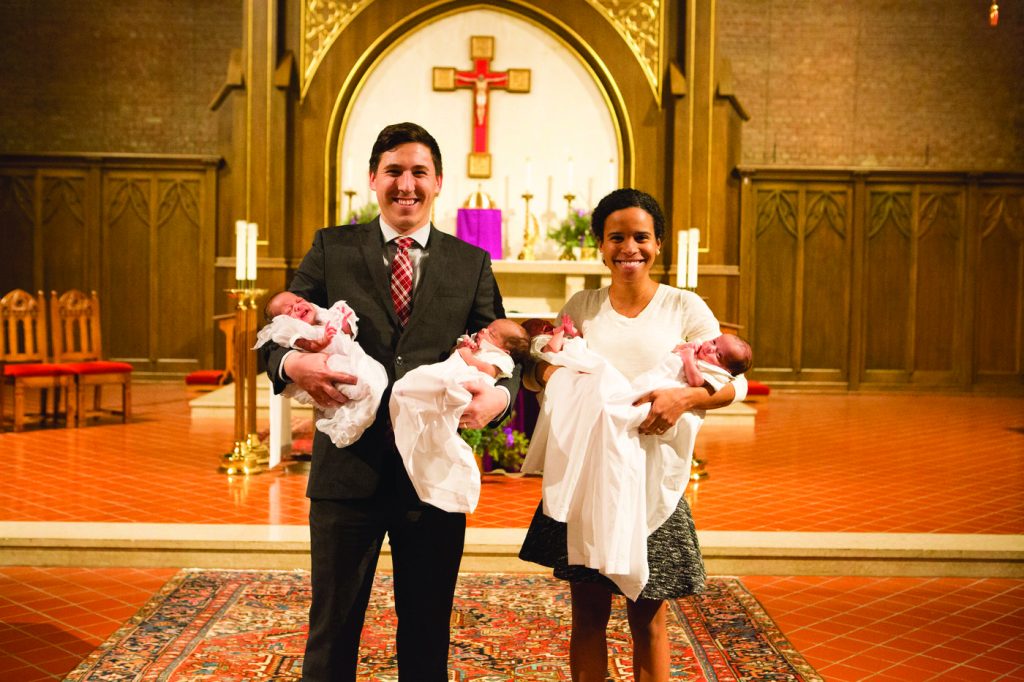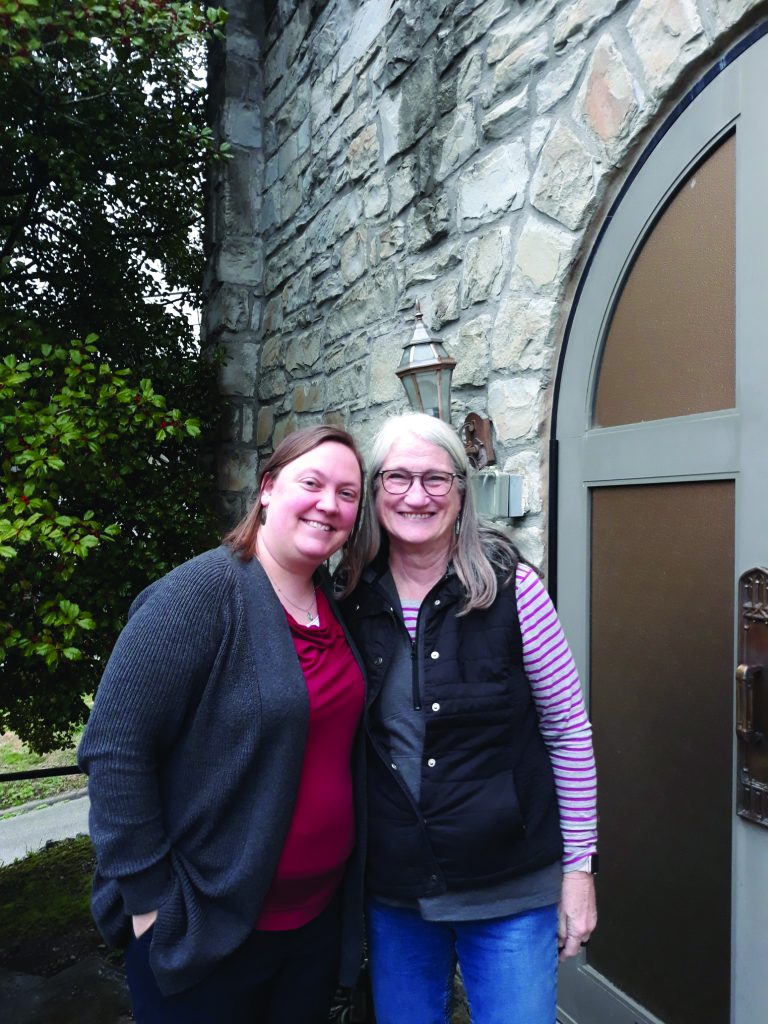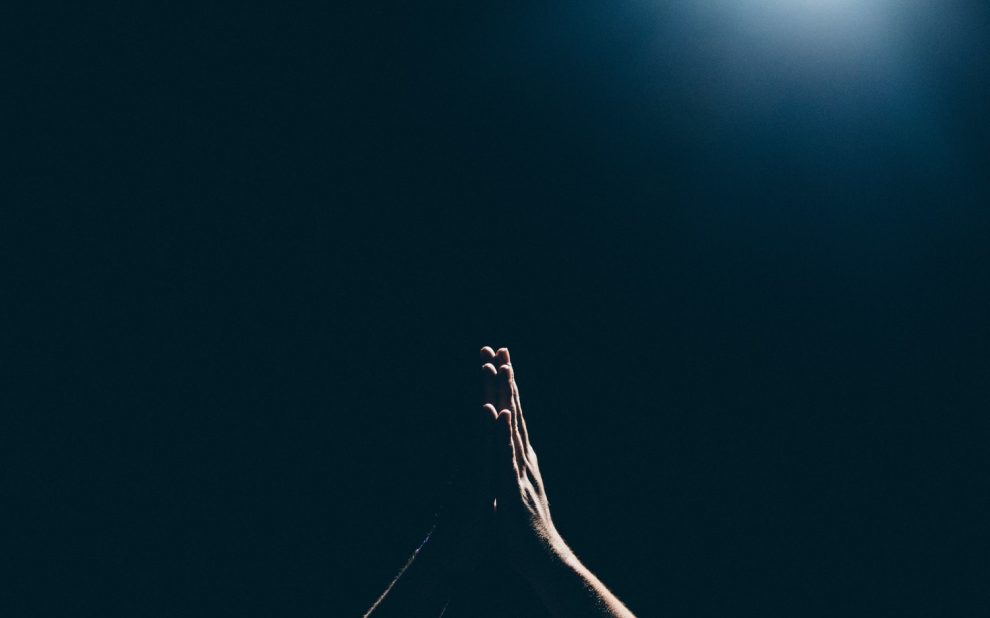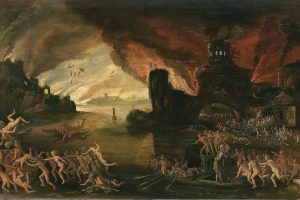When Justina Hausmann Kopp found out she was pregnant with quadruplets, the joy of conceiving a child now carried with it a daunting new dimension.
“I had to break my body wide open for these guys,” she recalls of her pregnancy. “It was very challenging, definitely one of the hardest things I’ve ever done.” The quadruplets are now 5 years old, and Kopp is studying to become a marriage and family therapist.
“It’s been a ride. We’ve learned a lot about ourselves, and we’ve learned a little bit about God,” Kopp says. In all of it, she’s become aware of her reaction when people, viewing her family life in the Twin Cities from the outside, say, “Oh, you’re so blessed!”
“I get a little uncomfortable,” says Kopp, noting the struggles of friends who’ve experienced infertility and the losses of multiple pregnancies. Why should she be blessed and not them? “It puts God in too small of a box when we put it that way, and we hurt people unintentionally when we talk about it that way,” she says.
Despite the ubiquitous role of blessings in Catholic faith practice—blessing mothers, couples, fields, throats, cars—Kopp’s encounters are not unique. Catholics and other Christians struggle to grasp what it means to be blessed, using the term loosely and as a hashtag, often veering into territory that has more to do with the prosperity gospel than actual Catholic theology. And while she rejects these frames, Kopp’s faith does lead her to recognize blessings in her life, but it’s not a shallow understanding of grace.
“God has entrusted me with this very unique journey,” she says, noting that God is not only there in it but also invites her into deeper relationship with the divine and with the people in her life. “The real gift here is the new relationship that I have.”
The big picture
“Blessings are always really referring more to God than to us,” says Msgr. Richard Hilgartner, pastor of St. Joseph’s Church in Cockeysville, Maryland. As part of the sanctifying role of the church, Hilgartner notes that blessings serve to invoke God’s help, presence, and love in a person’s life.

“It’s not that we’re somehow mediating the power of God,” he says, but rather invoking, reminding people of something that’s always there.
As former head of the United States Conference of Catholic Bishops’ national divine worship office, Hilgartner has a deep grasp of liturgy in which blessings play a major role. As a priest of the Archdiocese of Baltimore, he’s also had the experience of blessing a large freighter—a ship that transports cars—at the invitation of a parishioner. While blessing cars and other nonreligious items might strike some people as odd, Hilgartner sees the bigger picture.
“We’re acknowledging that the presence of God in our lives is not limited,” he says. “If we’re aware of the incarnational nature of God . . . everything we do can be given over to God.” So, for example, when blessing a new car: “I’m not so much blessing the car itself. I’m invoking God’s protection on me as I drive.” And, he cautions, one can never dismiss the potential of a blessing: “For that person it might be a profound moment.”
Rabbi Rachel Mikva, professor of Jewish studies at Chicago Theological Seminary, says the Jewish understanding of blessing is one of recognizing that creation overflows with blessing, and, accordingly, most Jewish prayer is thanksgiving.
“The Hebrew word for blessing is essentially a recognition of something magnificent, beautiful, beneficial, full of potential in the universe,” says Mikva. Even God’s commandments are “opportunities for relationship with God and [recognition of] our own purpose.”
Not a magic spell
One great temptation when thinking of blessings is to equate God’s favor with material wealth and physical health, as articulated by the prosperity gospel of some Protestant denominations. But this is not the Catholic or Jewish theology of blessing.
“There are ways to secure wealth and status that are going against God’s will,” notes Kate Ward, a theological ethics professor at Marquette University and author of the book Wealth, Virtue, and Moral Luck: Christian Ethics in an Age of Inequality (Georgetown University Press). “The prosperity gospel is very selective in terms of how wealth is interpreted. . . . God could bless the rich by casting them down.”
This upending of associations of wealth and status goes right back to the gospels, notes Hilgartner. “Jesus was really challenging the status quo there by telling this guy that, in order to inherit eternal life, he had to shed all these things that he thought were signs of favor,” he says. The challenge then, when thinking about God’s gifts in one’s life, is to “make room for something else that isn’t what you think it is.”
Ward concurs: “The question is how can you serve God in that status and how can you discern where God is calling you next.”

Jesuit Father Ryan Duns, a systematic theologian at Marquette University, also takes issue with equating blessings to protection, likening it to a “Harry Potter imagination that somehow we have this magic spell put over us that’s going to protect us.” The reality, he says, is far richer. “It is a dark grace. It leads us into a real confrontation with the full scope of history,” Duns says. “Even in the darkness and the chaos and the difficulty, we’re not alone. The blessing is one of real presence.”
Catholic writer and podcaster Theresa Zoe Williams sees this clearly reflected in how a platitude like “Children are a blessing” misses the reality of being a parent. “Blessings don’t tie things up in neat bows,” she says. “Blessings are a heck of a lot closer to curses than we want to believe.” Williams cites the struggle of searching for the best resources for her daughter’s special needs. “Her being a blessing doesn’t mean it’s suddenly easier or that I have all of the tools to deal with it,” she says. “It’s just a reminder that God creates all and his ways are not my ways.”
Kopp sees this dynamic at work in the struggles of parenting four small children at once but also elsewhere in her life, such as the loss of her father in the 2007 collapse of the I-35 West Mississippi River bridge in downtown Minneapolis, which killed 13 people.
“Was I less blessed because my dad died in a crazy, insane accident? No,” Kopp asserts. But she sees in her life a rebuttal of another platitude, that “God won’t give you more than you can handle.”
“Absolutely he does!” she says. “I cannot do this myself. I need my husband, and I need my mom.” When it comes to parenting her quadruplets, she realizes, “I need to be vulnerable and humble myself” and “be receptive to the goodness of people around me.”
This is something other parents face, but “it’s just a lot more obvious in my situation,” she adds. “We’re meant to be in community and help one another.”
God in all things
The Jesuit theologian Karl Rahner asserted that, before original sin, creation existed in a state of “original blessing.”
“If you look at Genesis, God saw that it was good,” explains Duns. “And what is that original blessing? Relationship. An unbroken, untrammeled relationship.”
Duns looks to the Eucharist as one example of how people neglect to see the relationship available to us. “We think of the real presence as this thinglike presence over there,” he says. But in reality, he continues, “The Eucharist is Jesus Christ real presence-ing, letting God do what God is always trying to do, which is feed us.”
“God is there all the time. We need to have a conscious awareness of that,” says Bishop Richard Pates, retired bishop of Des Moines. “But perhaps we are not taking that into account directly or at that very moment.”
Pates notes that people tend to have heightened awareness of God’s presence in contexts where blessings are given, such as weddings and anniversaries, but adds that he’s also witnessed cultures—in Africa, Asia, and Latin America—that more explicitly live out that awareness of God’s presence. As a result, he doesn’t think that people declaring themselves to be “blessed” (or #blessed) is necessarily a platitude.
“We don’t want daily bread. We want a deep freezer filled with crap. There’s no deep freezer with grace.”Father Ryan Duns, S.J.
“It’s an openness to what God wants for you and an acceptance of that,” says Pates. “It’s an awareness that we are dependent on God and an awareness that it is his good providence that carries us forward. We need to trust in him, and we have to examine what we really are praying for.”
Throwing oneself into God’s hands and investing in the relationship by continually asking for help is tough in a U.S. context, where people have bought into materialistic and even narcissistic self-sufficiency.
“They’ve been fed this thin gruel of what’s going to make them happy,” says Duns of the cultural climate. True blessing, on the other hand, is found in looking beyond the self. “The ways we enact and embody love, that’s part of the blessing—the strength to hang on another day.” One illustration of this is in the Lord’s Prayer, the petition to “give us this day our daily bread.” “We don’t want daily bread. We want a deep freezer filled with crap,” he notes. “There’s no deep freezer with grace.”
But Ward notes that such a sense of security, spiritual or otherwise, is an illusion. “When something is good, there can be this real sense of gratitude,” she says. “And when it’s not, we’re very powerfully aware that we’re not self-sufficient.” But both are gifts, and the question is what we do with what we’re given.
Look for your blessings
When Lori Helfrich tells people that she does parish ministry in Hazard, Kentucky, they are quick to associate the small town in Appalachia with widespread unemployment, addiction, and food insecurity—all of which are true as the community reels in the wake of the coal industry’s retreat from the region. But Helfrich, parish life director at Mother of Good Counsel Catholic Church, knows this is a superficial portrait of the people she serves.

As Helfrich encounters Catholics, non-Catholic Christians, and people with no religious affiliation, she sees a common thread of desiring community and wanting to bring something to the community. In that context, she counsels people to look for their blessings.
“How is God’s grace and abundance in your life? How can that be shared with other people? Because so often it’s a scarcity mentality,” she notes. “If you start to build those relationships, you don’t have the scarcity. . . . When you talk with God and be with God, there’s an abundance in your life.”
As Helfrich prays with people and meets them where they are, she fosters an environment of letting go of control and learning to share the abundance they have all received. This might look like their farmers market, which has seen an exponential increase in people living on the Supplemental Nutrition Assistance Program’s (SNAP) benefits buying more and better food. But the fruits are also spiritual, with God showing up in other people, often unexpectedly.
“We give what we have,” says Helfrich. “When you do that, God pops in with these little surprises, ‘Here, this is for you. It’s an affirmation of the relationship we have.’” In the end, God feeds them and, “You end up with much more than you ever could have needed,” she says.
Ministering as a bishop, one who gives countless blessings, Pates concurs that God’s abundance is crucial. “God is totally gratuitous,” he says. “It’s our responsibility to come to consciousness of it and then to live by it.”
But living by it is not something a person can do alone, that is, without relationships.
“Sometimes abundance is difficult. It is too much,” Kopp says of her experiences of pregnancy and parenthood. “I can’t carry God all by myself.”
Kopp sees the blessing in that having four babies at once—a superabundance—forced her to abandon any semblance of doing it on her own, which she says she might have tried had she had one baby at a time. (At times, she thinks it’s “pure genius” on God’s part.) It’s also one more reason she bristles at “You’re so blessed” language.
“That doesn’t leave a whole lot of room to talk about what it’s really like,” she says, noting that it let people keep her at arm’s length, which fosters disconnection and isolation.
Be a blessing
Duns recalls that his grandmother was fond of the phrase, “There but by the grace of God go I.” With some regret, he now realizes she was wrong.
“God’s grace doesn’t hold us back. It thrusts us in. It’s there because of God’s grace we go!” he says. And this has real-life implications.
In Judaism, this is rooted in God’s charge to Abraham to be a blessing. “There is a commandedness to that, that we ourselves should seek to be a blessing in the world,” says Mikva.
“If you think for one moment that blessing absolves you or removes you from the muck of the world . . . then you need to do a reality check,” says Duns. This includes being in solidarity with the poor and hearing the cries of oppressed people. “We respond because of our religion,” he adds. “If your God doesn’t ask you to do something, it’s not a relationship.”
And as human relationships are meant to reflect the divine relationship, one disconnect in the church that Kopp, a Black Catholic, notes is the persistence of racism.
“If your God doesn’t ask you to do something, it’s not a relationship.”Father Ryan Duns, S.J.
“We can all agree, per the Catechism [of the Catholic Church], that racism is a sin,” she says. “Here’s a place where the human family is fractured. Here’s a place where sin has entered in. Wouldn’t you want to fix that?” Instead, she has found an impulse to protect what is there.
Mikva notes from her studies that this sort of purification is a necessary step for faith traditions. “If we want religion to be a blessing, then we have to approach it using the self-critical tools of the tradition,” she says. For Catholics, this could include not only the catechism but a formidable body of official teachings condemning the evil of racism.
“It’s really disappointing that a religion that understands systemic sin won’t work on this systemic sin in a meaningful way,” says Kopp. “That power dynamic is not of God. That power dynamic is man-made.”
And what we know of God should be instructive in our ability to let go of scarcity narratives and trust that blessings abound when we share ourselves with one another and learn and grow from that encounter, says Pates: “We’re moving to a deeper appreciation that this is just what God is, and we do not earn it ourselves. But again, it’s always an expression—as the sacraments are—of God’s gratuitousness. He’s just right there for us. He loves us tremendously.”
“Abundance is an invitation to enter in,” says Kopp. “There’s going to be enough for everybody. It’s too much for one person to hold for themselves. . . .What does it mean when you refuse?”
This article also appears in the February 2022 issue of U.S. Catholic (Vol. 87, No. 2, pages 10-14). Click here to subscribe to the magazine.
Image: Unsplash/Amaury Guttierez















Add comment